高中英语必修一第二单元教案1
- 格式:doc
- 大小:52.50 KB
- 文档页数:6
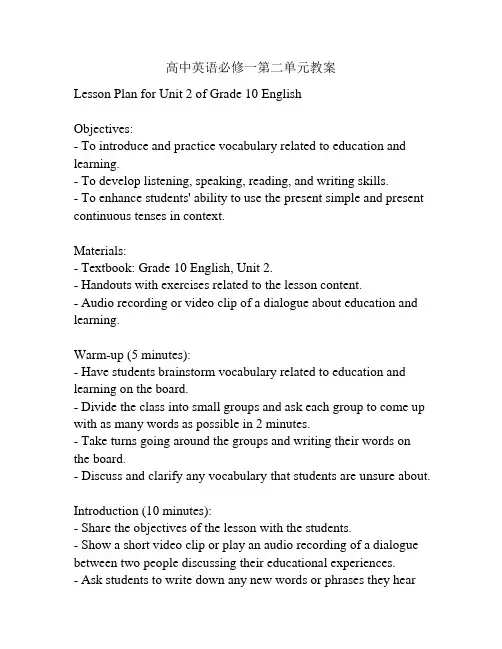
高中英语必修一第二单元教案Lesson Plan for Unit 2 of Grade 10 EnglishObjectives:- To introduce and practice vocabulary related to education and learning.- To develop listening, speaking, reading, and writing skills.- To enhance students' ability to use the present simple and present continuous tenses in context.Materials:- Textbook: Grade 10 English, Unit 2.- Handouts with exercises related to the lesson content.- Audio recording or video clip of a dialogue about education and learning.Warm-up (5 minutes):- Have students brainstorm vocabulary related to education and learning on the board.- Divide the class into small groups and ask each group to come up with as many words as possible in 2 minutes.- Take turns going around the groups and writing their words on the board.- Discuss and clarify any vocabulary that students are unsure about. Introduction (10 minutes):- Share the objectives of the lesson with the students.- Show a short video clip or play an audio recording of a dialogue between two people discussing their educational experiences.- Ask students to write down any new words or phrases they hearduring the listening activity.- Ask a few students to share their observations with the class. Vocabulary and Listening (15 minutes):- Provide students with a list of vocabulary words related to education and learning.- Ask students to match each word with its definition.- Play the audio recording or video clip again, if needed, and ask students to listen for the vocabulary words they have just learned. - After the listening activity, discuss the meaning and usage of the vocabulary words as a class.- Conduct a short listening comprehension activity, where students answer questions based on the dialogue they heard.Reading and Comprehension (20 minutes):- Provide students with a short reading passage about the importance of education.- Ask students to read the passage individually and then answer comprehension questions.- After giving students some time to complete the questions, discuss the answers as a class.- Encourage students to share their thoughts on the topic of education and its significance.Grammar Practice (15 minutes):- Review the present simple and present continuous tenses with the class.- Provide examples of sentences using these tenses in the context of education and learning.- Ask students to work in pairs and create their own sentencesusing the present simple and present continuous tenses.- Monitor the pairs and provide assistance if needed.- Ask some pairs to share their sentences with the class.Writing Activity (15 minutes):- Instruct students to write a short paragraph about their own educational experiences.- Encourage them to use the vocabulary words and tenses they have learned in the previous activities.- After giving students enough time to complete their writing, ask a few volunteers to share their paragraphs with the class.Wrap-up and Homework (5 minutes):- Recap the key points covered in the lesson.- Assign a homework task, such as writing a diary entry about a typical school day using the present simple and present continuous tenses.- Collect students' paragraphs and homework.This lesson plan is designed to engage students in active learning and practice various language skills. Each activity is aimed at meeting the lesson objectives and can be adjusted based on the students' proficiency level and needs.。
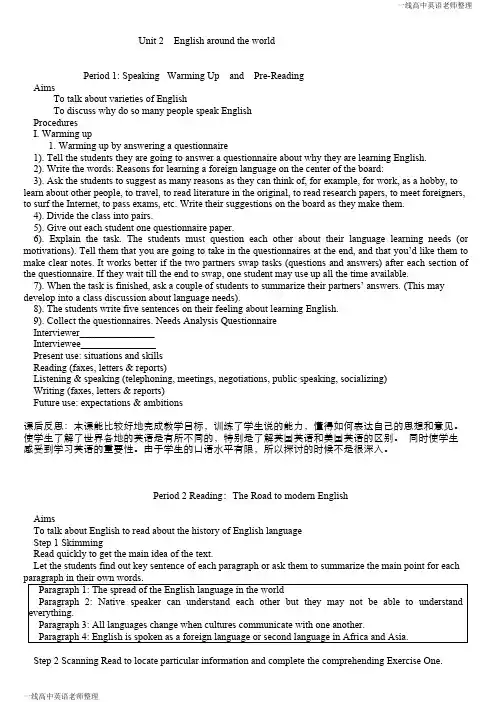
课后反思:本课是阅读课。
英语阅读教学是高中教学的重中之重。
许多英语教师对阅读训练也给予了足够的重视,但是在训练方式上却存在较多的问题。
多数教师过分注重语法结构的分析和句子的机械翻译而忽视技巧培养。
只有在阅读教学中教给学生一些学习策略,培养阅读技巧,才能让学生有可能通过课外自学来扩大知识的摄取量,从而弥补课堂英语阅读教学的不足。
由于时间仓促以及学生口语水平的局限,本课时在学生让学生讨论的环节上,气氛不够热烈,讨论时间不足,今后应尽量鼓励学生多开口说英语,以弥补这方面的缺陷。
Period 3: Reading (Language points)Aimto master some words and phrases1. include v.a) containThe price includes both house and furniture.b) embrace thing as part of wholeI include him among my friends.2. present a) adj: being at hand; being now出席的, 在场的;现在的, 当前的该词可做前置定语也可做后置定语,当它做前置定语其义为“现在的”,做后置定语其义为“出席的”The present members 现在的成员 The members present 在场的成员b) n: giftHe often gave his neighbor's kids little presents.c)vt: to offer赠送,呈献[(+to/with)]They presented him with a bunch of flowers.3. culture n: understanding of literature, art, music, etcHe has studied the cultures of many western countries.4. identity n: who or what a person or thing isYou should show your identity card before you enter it.5.rulea) n:custom or statement about what must not be doneHe’s made it a rule to rise early.It’s against the rules of the school to smoke.。
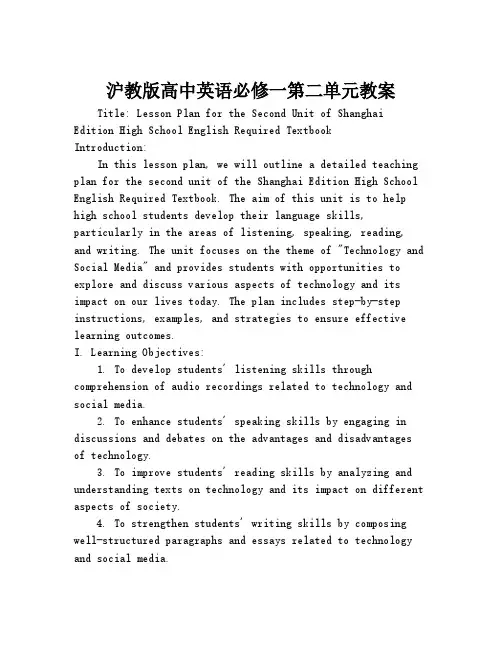
沪教版高中英语必修一第二单元教案Title: Lesson Plan for the Second Unit of ShanghaiEdition High School English Required TextbookIntroduction:In this lesson plan, we will outline a detailed teaching plan for the second unit of the Shanghai Edition High School English Required Textbook. The aim of this unit is to help high school students develop their language skills, particularly in the areas of listening, speaking, reading, and writing. The unit focuses on the theme of "Technology and Social Media" and provides students with opportunities to explore and discuss various aspects of technology and its impact on our lives today. The plan includes step-by-step instructions, examples, and strategies to ensure effective learning outcomes.I. Learning Objectives:1. To develop students' listening skills through comprehension of audio recordings related to technology and social media.2. To enhance students' speaking skills by engaging in discussions and debates on the advantages and disadvantages of technology.3. To improve students' reading skills by analyzing and understanding texts on technology and its impact on different aspects of society.4. To strengthen students' writing skills by composing well-structured paragraphs and essays related to technology and social media.5. To encourage critical thinking and fostercollaborative learning through group activities and projects. II. Warm-up Activity:Begin the lesson by asking students to share their experiences with technology and social media. Questions can include:- How often do you use technology and social media inyour daily life?- What are some advantages and disadvantages of using technology and social media?III. Listening:1. Pre-listening:- Introduce key vocabulary related to the listening task.- Present a short introduction to the topic of the audio recording.- Activate students' prior knowledge by asking questions related to the content of the listening task.2. While-listening:- Play the audio recording once for general understanding.- Distribute comprehension questions related to the audio recording.- Play the recording again, pausing at intervals to allow students to answer the comprehension questions.3. Post-listening:- Discuss the answers to the comprehension questions as a class.- Engage students in a group discussion about their opinions on the topic of the audio recording.- Encourage students to reflect on the impact of technology and social media in their lives.IV. Speaking:1. Class Debate:- Divide students into groups.- Assign each group a specific topic related to technology and social media.- Instruct each group to prepare arguments and counter-arguments for a class debate.- Conduct the debate, allowing each group to presenttheir arguments and respond to counter-arguments.2. Role-Play:- Provide students with role-play scenarios related to technology and social media.- In pairs or small groups, students should act out the scenarios, using appropriate language and vocabulary.V. Reading:1. Pre-reading:- Introduce the text by discussing the title, author, and context.- Activate students' prior knowledge by asking questions related to the topic of the text.2. While-reading:- Students read the text individually or in pairs.- Provide comprehension questions for students to answer while reading.3. Post-reading:- Discuss the answers to the comprehension questions as a class.- Engage students in a group discussion about their opinions on the issues presented in the text.- Encourage students to draw connections between the text and their own experiences.VI. Writing:1. Paragraph Writing:- Assign a writing task related to the theme of technology and social media.- Provide a specific prompt or give students the freedom to choose their own topic.- Model the process of writing a well-structured paragraph and discuss the importance of coherence and supporting evidence.2. Essay Writing:- Instruct students to research and gather information on a specific aspect of technology and social media.- Provide guidelines for essay structure, including an introduction, body paragraphs, and a conclusion.- Emphasize the importance of proper citation and referencing.Conclusion:In conclusion, this lesson plan provides a comprehensive approach to teaching the second unit of the Shanghai Edition High School English Required Textbook. By focusing on the theme of technology and social media, students will have the opportunity to develop their language skills while exploring and discussing its impact on our lives. The plan incorporates various activities, allowing for a well-rounded learning experience that promotes critical thinking, collaboration, and effective communication. Through this unit, students can enhance their understanding of technology's role in contemporary society.Note: The actual lesson plan may vary based on individual teaching styles and classroom dynamics.。
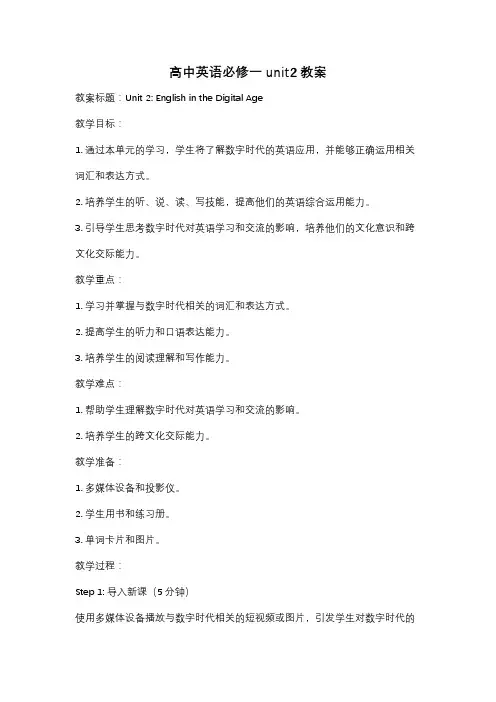
高中英语必修一unit2教案教案标题:Unit 2: English in the Digital Age教学目标:1. 通过本单元的学习,学生将了解数字时代的英语应用,并能够正确运用相关词汇和表达方式。
2. 培养学生的听、说、读、写技能,提高他们的英语综合运用能力。
3. 引导学生思考数字时代对英语学习和交流的影响,培养他们的文化意识和跨文化交际能力。
教学重点:1. 学习并掌握与数字时代相关的词汇和表达方式。
2. 提高学生的听力和口语表达能力。
3. 培养学生的阅读理解和写作能力。
教学难点:1. 帮助学生理解数字时代对英语学习和交流的影响。
2. 培养学生的跨文化交际能力。
教学准备:1. 多媒体设备和投影仪。
2. 学生用书和练习册。
3. 单词卡片和图片。
教学过程:Step 1: 导入新课(5分钟)使用多媒体设备播放与数字时代相关的短视频或图片,引发学生对数字时代的兴趣,并引导他们思考数字时代对英语学习和交流的影响。
Step 2: 学习新词汇(15分钟)教师通过多媒体展示数字时代相关的词汇,并逐一解释其意义和用法。
学生跟读并记忆新词汇,并使用单词卡片进行词汇复习和巩固。
Step 3: 听力训练(20分钟)教师播放与数字时代相关的听力材料,要求学生仔细听取并回答相关问题。
随后,教师与学生一起讨论听力材料中的内容,并帮助学生理解其中的关键信息。
Step 4: 阅读理解(20分钟)学生阅读与数字时代相关的短文或文章,并回答相关问题。
教师可以提供一些问题引导学生思考数字时代对英语学习和交流的影响,并引导学生进行讨论和分享。
Step 5: 口语练习(15分钟)学生分组进行口语练习,讨论数字时代对英语学习和交流的影响。
教师可以提供一些话题和问题,引导学生展开对话,并提供必要的语言支持和指导。
Step 6: 写作训练(20分钟)学生根据所学内容,撰写一篇关于数字时代对英语学习和交流的影响的短文。
教师可以提供写作指导和范文,帮助学生提高写作能力,并对学生的作文进行批改和评价。
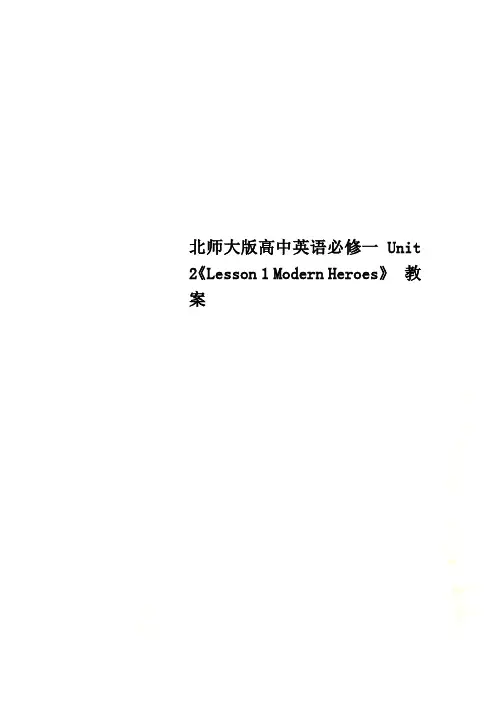
北师大版高中英语必修一Unit 2《Lesson 1 Modern Heroes》教案一、教学过程及分析教学步骤教学内容设计意图Step 1 Warming-up 1.Students watch a video clip of YangLiwei and ShenzhouV;3mins2.Introduce some information aboutChina’s Shenzh ou spaceships. (HandoutEx1)2mins1、播放神舟5号发射升空、杨利伟在太空与地面控制中心通话以及安全返回着陆的简短视频,迅速吸引学生注意力,激发兴趣,活跃课堂气氛;视频内容与课文大致相同,为下面阅读课文作铺垫;2、从神舟1号到神舟7号的知识介绍,增强学生对祖国的自豪感和激发强烈的爱国情怀。
Step 2 New words learning Students learn the new words with the helpof some pictures or some sentences.3mins通过图片和上下文语境来学习单词,能让学生更好地掌握新词。
Step 3 General reading Students go through the passage and matchthe six headings with paragraphs.(HandoutEx2)3mins大意匹配能培养学生扫读的能力,快速掌握文章大意和结构。
Step 4 Detailed reading 1.Students find out information aboutwhat the numbers stand for and they areguided to summarize the general idea ofthe text with the information theyfind.(Handout Ex3)4mins2.Students, divided into four groups,compete to find out what the spaceshipand Yang Liwei did during the spaceflight.(Handout Ex4)6mins3.Students are guided to summarize PastSimple and Past Continuous.1、列出数字让学生找相关信息能很好培养学生快速寻读获取信息能力;用这些信息概括文章大意能很好地训练学生处理信息的能力;2、让学生以小组竞赛的形式找出航天过程的细节,并用表格的形式呈现出来,3 mins 让学生对课文有更直观更系统的认识;2、引导学生归纳并总结语法现象,培养学生自主学习的能力;Step 5 Summary Students listen to the Mp3 of the text andcomplete the summary of the text.(HandoutEx5)4mins听课文录音(获取信息),填课文总结(处理信息),再一次熟悉课文内容。
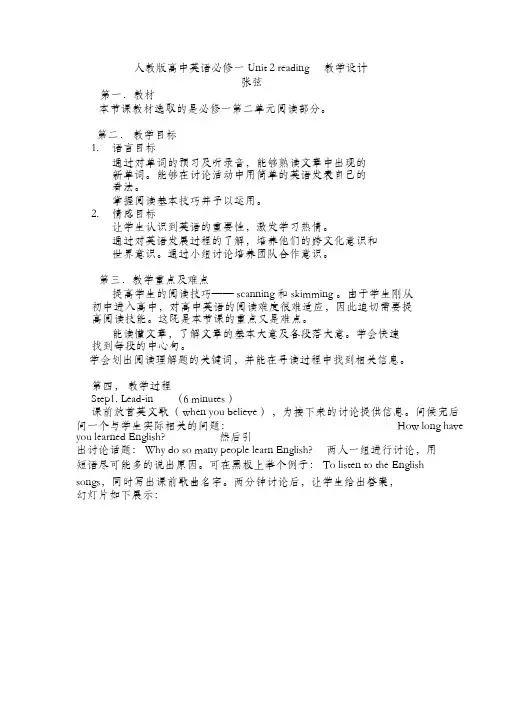
人教版高中英语必修一 Unit 2 reading 教学设计张弦第一.教材本节课教材选取的是必修一第二单元阅读部分。
第二.教学目标1.语言目标通过对单词的预习及听录音,能够熟读文章中出现的新单词。
能够在讨论活动中用简单的英语发表自己的看法。
掌握阅读基本技巧并予以运用。
2.情感目标让学生认识到英语的重要性,激发学习热情。
通过对英语发展过程的了解,培养他们的跨文化意识和世界意识。
通过小组讨论培养团队合作意识。
第三.教学重点及难点提高学生的阅读技巧—— scanning 和 skimming 。
由于学生刚从初中进入高中,对高中英语的阅读难度很难适应,因此迫切需要提高阅读技能。
这既是本节课的重点又是难点。
能读懂文章,了解文章的基本大意及各段落大意。
学会快速找到每段的中心句。
学会划出阅读理解题的关键词,并能在寻读过程中找到相关信息。
第四,教学过程Step1. Lead-in (6 minutes )课前放首英文歌( when you believe ),为接下来的讨论提供信息。
问候完后问一个与学生实际相关的问题:How long have you learned English? 然后引出讨论话题: Why do so many people learn English? 两人一组进行讨论,用短语尽可能多的说出原因。
可在黑板上举个例子: To listen to the English songs,同时写出课前歌曲名字。
两分钟讨论后,让学生给出答案,幻灯片如下展示:A Brainstorming Map:Why do so many people learnEnglish?To use for business One of the officiallanguages of the OlympicGamesTo talk to native Why do so manyTo read English people learnEnglish?booksEnglish speakersTo listen to EnglishTo surf the Internet music or watch Englishmovies然后再问学生: How much do you know about the Englishlanguage?入本课主题: the road to modern English.再进Step 2: Pre-reading ( 3minutes )用三张幻灯片预习本文中的生单词及短语,为阅读扫清障碍。
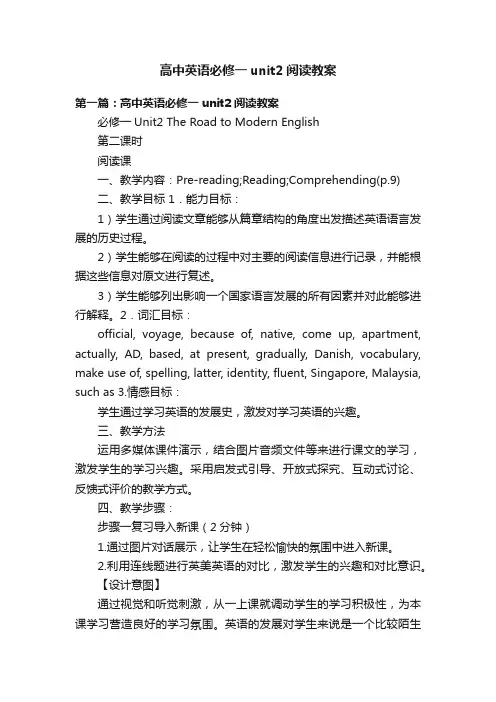
高中英语必修一unit2阅读教案第一篇:高中英语必修一unit2阅读教案必修一Unit2 The Road to Modern English第二课时阅读课一、教学内容:Pre-reading;Reading;Comprehending(p.9)二、教学目标 1.能力目标:1)学生通过阅读文章能够从篇章结构的角度出发描述英语语言发展的历史过程。
2)学生能够在阅读的过程中对主要的阅读信息进行记录,并能根据这些信息对原文进行复述。
3)学生能够列出影响一个国家语言发展的所有因素并对此能够进行解释。
2.词汇目标:official, voyage, because of, native, come up, apartment, actually, AD, based, at present, gradually, Danish, vocabulary, make use of, spelling, latter, identity, fluent, Singapore, Malaysia, such as 3.情感目标:学生通过学习英语的发展史,激发对学习英语的兴趣。
三、教学方法运用多媒体课件演示,结合图片音频文件等来进行课文的学习,激发学生的学习兴趣。
采用启发式引导、开放式探究、互动式讨论、反馈式评价的教学方式。
四、教学步骤:步骤一复习导入新课(2分钟)1.通过图片对话展示,让学生在轻松愉快的氛围中进入新课。
2.利用连线题进行英美英语的对比,激发学生的兴趣和对比意识。
【设计意图】通过视觉和听觉刺激,从一上课就调动学生的学习积极性,为本课学习营造良好的学习氛围。
英语的发展对学生来说是一个比较陌生的话题,所以学生头脑中可能没有相关的背景知识,教师只能从简单的问题入手,启发学生进行思考。
步骤二、阅读听说理解文章(20分钟)1.fast reading 部分要求学生迅速阅读课文,找到文章主旨大意,并完成填空题。
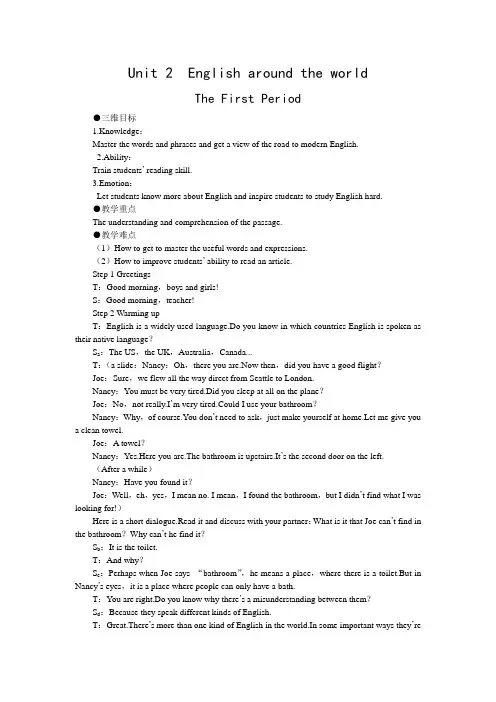
Unit 2 English around the worldThe First Period●三维目标1.Knowledge:Master the words and phrases and get a view of the road to modern English.2.Ability:Train students’ reading skill.3.Emotion:Let students know more about English and inspire students to study English hard.●教学重点The understanding and comprehension of the passage.●教学难点(1)How to get to master the useful words and expressions.(2)How to improve students’ ability to read an article.Step 1 GreetingsT:Good morning,boys and girls!S:Good morning,teacher!Step 2 Warming upT:English is a widely used language.Do you know in which countries English is spoken as their native language?S a:The US,the UK,Australia,Canada...T:(a slide:Nancy:Oh,there you are.Now then,did you have a good flight?Joe:Sure,we flew all the way direct from Seattle to London.Nancy:You must be very tired.Did you sleep at all on the plane?Joe:No,not really.I’m very tired.Could I use your bathroom?Nancy:Why,of course.You don’t need to ask,just make yourself at home.Let me give you a clean towel.Joe:A towel?Nancy:Yes.Here you are.The bathroom is upstairs.It’s the second door on the left.(After a while)Nancy:Have you found it?Joe:Well,eh,yes,I mean no. I mean,I found the bathroom,but I didn’t find what I was looking for!)Here is a short dialogue.Read it and discuss with your partner:What is it that Joe can’t find in the bathroom?Why can’t he find it?S b:It is the toilet.T:And why?S c:Perhaps when Joe says “bathroom”,he means a place,where there is a toilet.But in Nancy’s eyes,it is a place where people can only have a bath.T:You are right.Do you know why there’s a misunderstanding between them?S d:Because they speak different kinds of English.T:Great.There’s more than one kind of English in the world.In some important ways they’redifferent.They’re called world English.Can you guess what they include?S e:Canadian,British,American,Australian and Indian English.T:Right.So you know even two native speakers of English may still not speak the same kind of English.Look at the examples on P9.Now try to guess which of the following words are British English and which are American English.Suggested answers:Am.English:mom;on a team;rubber;gasBr.English:mum;in a team;eraser;petrolStep 3 New WordsT:From today on,we’ll learn something about English around the world.First of all,let’s get familiar with the new words.Yesterday I asked you to read the new words and look up the meaning of them.Now let’s have a game in which one of you tells us the meaning or the explanation of the words and the others guess which word it is.Let’s go!Suggested explanation:1.include:have something or somebody as one of a group.e.g.:The tour included a visit to the Science Museum.2.play a role in:have a part in3.international:connected with two or more countries4.native:(1)connected with the place where you have always lived or have lived for a long time(2)a person who lives in a particular place,especially sb. who has lived there a long time5.elevator:lift6.flat:(1)having a smooth surface (2)(Br. E)a set of rooms for living in7.apartment:(Am. E)a set of rooms for living in8.modern:of the present time or recent timee up:to move toward10.culture:the customs and beliefs,art,way of life and social organization of a particular country or group11.actually:really;in fact12.present:(1)existing or happening now (2)being in a particular place13.rule:control14.vocabulary:all the phrases and phrases you learnage:the way in which words are used in a language16.identity:who or what sb./sth. isernment:the group of people who are responsible for controlling a country or a state18.rapidly:fastT:That’s great!You’ve made a good preparation.Now please read the words together.(show words and explanations on the slide)Step 4 Pre-readingT:Just now,we’ve known that there’re many kinds of English in the world.Then why are there so many kinds?Ss:We don’t know.T:Anyway,we’ll find out the cause today.Now read the title of the passage “the road to modern English”.What do you think it will tell us?S f:I guess it will tell us the development of English.Step 5 SkimmingT:Now let’s find out whether your answer is right.So please read the passage fast in silence and find out the main idea of each paragraph.Suggested answer:Para.1:Brief introduction of the change in English.Para.2:An example of different kinds of English.Para.3:The development of English.Para.4:English spoken in some other countries.Step 6 ScanningT:You’ve mastered the structure of the passage.Now please read para.1 and 2 loud in detail.T:(several minutes later)Have you finished?Here’re some statements of which some are right while some not.Read them and then tell whether they are true or false.If false,please find out the mistake and correct it.(slides:1.Most of the English speakers in the 16th century lived in England.2.More and more people use English as their first or 2nd language.3.The US has the largest number of English speakers.4.Native English speakers can understand everything because they speak the same kind of English.)S g:The first one is true.S h:The second one is true.S i:The third one is false.China has the largest number of English speakers.S j:The fourth one is false.Native English speakers may not be able to understand everything because they do not speak the same kind of English.T:You did a very good job.Now please read para.3 after the tape.And then fill in the form oneffect that Chinese has on English?S k:In English there are some Chinese words such as gongfu,long time no see,...T:Great!With more closely communication of culture,English is changing more frequently.T:As we all know,English is spoken as the native language mostly in western countries.Then what about English in some other parts of the world?After reading the last paragraph,would you please say something about the present situation of English in your own words?S l:It is also spoken as a foreign or 2nd language in many other countries.For example,inIndia,it is used for government and education.In some African and Asian countries,it is also spoken,such as in South Africa,Singapore and Malaysia.While in China,the number of English speakers is increasing fast.T:Quite good.Step 7 DiscussionT:So far,we’ve known that English is becoming more and more important in China.It has been an important subject for Chinese students.But someone say that Chinese is a much more elegant language.So it is more important for us to master it and it is not so necessary for us to master a foreign language.Do you agree with this opinion and why?Suggested answer:I don’t agree with it.With the cultural communication becoming more and more frequent,the chance to contact foreigners,exported goods,international conferences,and so on,is more and more.As the most widely used language,English is regarded as the language used in most international situations.Thus,if we want to keep up with the times,we’d better master English and use it as a tool.Step 8 Summary and homeworkT:Today we’ve learned an article on “the road to modern English”.After class,you should read it again and again to get the idea of the text further.Do the exercises of comprehending and try to tell your partner something about English in our own words.That’s all for today.Class is over.The Second Period●三维目标1.Knowledge:Do some exercises to master words and phrases.2.Ability:Learn to use these words and phrases in daily life.3.Emotion:Train students perseverance and patience by remembering new words and phrases.●教学重点Explanation of words and phrases and practise using them.●教学难点How to let student master them well.●教学过程Step 1 Greetings and revisionGreet the whole class as usual.T:Yesterday we learnt a passage and I asked you to finish the comprehending exercises.Who can tell me the answer?S:A,D,C,D,BT:Great!Now who can retell the content of the passage to us?S:Let me try.English is used more and more today.The number of the people speaking it is increasing rapidly.China has the biggest number of English speakers.However,even two native speakers do not speak the same English because there are many kinds of English.That is caused by communication of culture.So actually even they can not understand everything they say.Besidesbeing spoken as the native tongue,English is also used as a foreign or 2nd language in many other countries.In a word,it is more and more important.Step 2 Learning about languageT:You did such a good job.You have mastered the text quite well.This period we will try to master the useful words and expressions in the first period.First let’s do exercise 1 in the part of learning about language.Please read the word or phrase and then match it with the right meaning.(Suggested answer:C D E F A B J G I H)T:Keep these words in mind.And then choose some of them to fill in the blanks in exercise 2.(suggested answer:native,actually,vocabulary,apartment,elevator)T:Now we’ll turn to a difficult one.You should fill in the blanks using the words from warming up and reading.At the same time,you’d better pay attention to the forms of the words.(Suggested answer:includes;culture;present;Actually;phrases;gas;international;rapidly;Actually;government)T:Well done!As we all know,there’re some differences between British English and American English.Can you give me some examples?S:(Ss can present their report on their research yesterday)Suggested examples about differences between Am.English and Br.English in spelling:(Suggested answers:In Am.English:on;on;of;on;from;on;In Br.English:in;at;to;into;at)T:Excellent.Just now you said that British and American English use different words to express the same meaning.Let’s move to exercise 5 and find out the different words that mean the same.S:sweets and candy;lorry and truck;autumn and fallT:So nice!Now please practise reading them in pairs,paying attention to the sentence stress and intonation.(Practice reading for a few minutes.)Step 3 Language pointsT:Then I’ll explain some useful words and expressions in warming-up and comprehending to you.1.include v.(never progressive)if one thing includes another,it has the 2nd thing as one of its parts.包含,包括e.g.The price includes dinner,beds,and breakfast.Durable goods includes such items as cars computers and electrical appliances.including prep.Included adj.(never before nouns)The bill came to $450,including tax.The bill came to $450,tax included.contain v.(never progressive)if sth. contain sth. else,it has that thing inside it or as part ofit.包含;含有;容纳e.g.This drink doesn’t contain any alcohol.There were four or five books containing toys and books.The information you need is contained in this report.container n.容器,集装箱2.play a role 扮演;起作用play (a role/part)as... in...在……中扮演……e.g.Monitor plays an important role in managing a class.The role he played as a hero in that movie won him many prizes.3.the number of... ……的数量(谓语动词为单数形式)a number of...大量的;修饰可数名词The number of homeless people has increased.Huge numbers of animals have died.A large number of problems have been raised.表示“许多”的词语归纳①只能修饰可数名词的有many,a good/great many,a (large/great)number of,many a (+n.)②只能修饰不可数名词的有much,a great/good deal of,a great amount of③可数和不可数均可修饰的有a lot of,lots of,plenty of,a large/great quantity of;quantities of4.even ifeven though 即使He didn’t take her advice,even though he knew it to be true.Even though he has got a good job,he still wants to look for a better one.5.not everythingnot与every,each,both,all,everything,everybody等连用为部分否定,全部否定用no one,none,neither,nothing,nobody,not any等。

人教高中英语必修一unit2教案Module 1 Unit 2 English around the world●单元规划本单元主要围绕English around the world这一主题介绍了英语的使用情况、发展情况及各地不同的方言。
第二单元English around the world的设计可分为五部分。
第一部分learn something about words and expressions;第二部分warming up and reading;第三部分the structure which expresses commands and requests;第四部分using language;第五部分writing and speaking;●课时安排本单元教学可分为6个课时。
第一课时vocabulary;第二课时为reading;第三课时为language points;第四课时为grammar;第五课时为using language;第六课时为writing and speaking;第七课时为revisionThe First Period Words and expressionsTeaching aims :1. Know the key words and expressions in the whole unit:elevator, petrol, official, voyage, actually, base, identity, command, request, recognize, straight, because of, come up, at present, such as, play a part (in)……2. Enable the students to get familiar with the pronunciation of the important words.3. Prepare for the learning process of the whole unit.Teaching important points :1.Get familiar with the words in the text part.2.Master the important expressions such as:bec ause of, come up, at present, such as, play a part (in)……Teaching methods: Task-based teaching and learning; cooperative-learning; group discussionTeaching procedures :Step 1、Self-directed learning学习方法指导:第一步:写出所给单词的音标;第二步:大声朗读三遍,注意画线字母的发音;第三步:依次写出画线字母的音标。
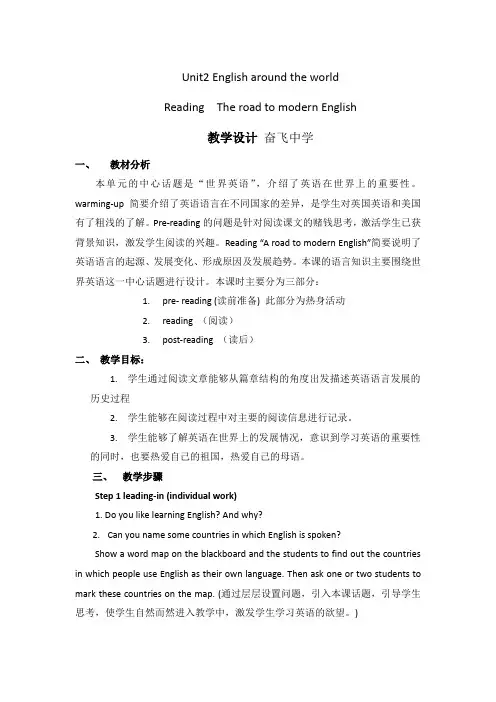
Unit2 English around the worldReading The road to modern English教学设计奋飞中学一、教材分析本单元的中心话题是“世界英语”,介绍了英语在世界上的重要性。
warming-up 简要介绍了英语语言在不同国家的差异,是学生对英国英语和美国有了粗浅的了解。
Pre-reading的问题是针对阅读课文的赌钱思考,激活学生已获背景知识,激发学生阅读的兴趣。
Reading “A road to modern English”简要说明了英语语言的起源、发展变化、形成原因及发展趋势。
本课的语言知识主要围绕世界英语这一中心话题进行设计。
本课时主要分为三部分:1.pre- reading (读前准备) 此部分为热身活动2.reading (阅读)3.post-reading (读后)二、教学目标:1.学生通过阅读文章能够从篇章结构的角度出发描述英语语言发展的历史过程2.学生能够在阅读过程中对主要的阅读信息进行记录。
3.学生能够了解英语在世界上的发展情况,意识到学习英语的重要性的同时,也要热爱自己的祖国,热爱自己的母语。
三、教学步骤Step 1 leading-in (individual work)1. Do you like learning English? And why?2.Can you name some countries in which English is spoken?Show a word map on the blackboard and the students to find out the countries in which people use English as their own language. Then ask one or two students to mark these countries on the map. (通过层层设置问题,引入本课话题,引导学生思考,使学生自然而然进入教学中,激发学生学习英语的欲望。

Unit2 English around the worldReading The road to modern English教学设计奋飞中学一、教材分析本单元的中心话题是“世界英语”,介绍了英语在世界上的重要性。
warming-up 简要介绍了英语语言在不同国家的差异,是学生对英国英语和美国有了粗浅的了解。
Pre-reading的问题是针对阅读课文的赌钱思考,激活学生已获背景知识,激发学生阅读的兴趣。
Reading “A road to modern English”简要说明了英语语言的起源、发展变化、形成原因及发展趋势。
本课的语言知识主要围绕世界英语这一中心话题进行设计。
本课时主要分为三部分:1.pre- reading (读前准备) 此部分为热身活动2.reading (阅读)3.post-reading (读后)二、教学目标:1.学生通过阅读文章能够从篇章结构的角度出发描述英语语言发展的历史过程2.学生能够在阅读过程中对主要的阅读信息进行记录。
3.学生能够了解英语在世界上的发展情况,意识到学习英语的重要性的同时,也要热爱自己的祖国,热爱自己的母语。
三、教学步骤Step 1 leading-in (individual work)1. Do you like learning English? And why?2.Can you name some countries in which English is spoken?Show a word map on the blackboard and the students to find out the countries in which people use English as their own language. Then ask one or two students to mark these countries on the map. (通过层层设置问题,引入本课话题,引导学生思考,使学生自然而然进入教学中,激发学生学习英语的欲望。
高一英语必修一第二单元教案英语教学成功与否,不仅取决于学习者的智力因素,还取决于他们情绪,态度、学习动力等,因此教师在任何时候要注意控制自己的情绪,不迁、怒、不急躁,切忌使用训斥,侮辱人格和伤害自尊心的语言;多使用鼓励,赞赏性的言语。
以下是整理的高一英语必修一第二单元教案,欢迎阅读。
Warming Up部分简要介绍了世界英语的分支以及英语语言在不同国家产生的差异,使学生感受英语语言的多文化、多层次、多元性,对英国英语和美国英语的不同有个粗浅的了解;Pre-Reading部分的两个问题引发学生对课文主题的思考,以便参加课堂活动; Reading部分The Road to Modern English 简要说明了英语语言的起源、发展变化、形成原因,以及它的发展趋势。
Comprehending部分旨在检查学生对课文基本内容的理解程度; Learning about Language 部分主要通过各种练习帮助学生重温本单元前几个部分的所学习的新单词和短语,同时也通过新的例子展现了美国英语、英国英语的差异,并着重介绍了半单元的语法项目;Using Language 部分中的Reading and talking主要介绍了当今世界各国各地说英语都有自己的特色,即便是美国东西部、南北部说话均有所不同。
The first period: Speaking: Warming Up and Pre-ReadingThe second period: Reading The Road to modern EnglishThe third period: Reading (Language points)The forth Period:Learning about LanguageThe fifth period: Using LanguageThe sixth period: Listening① 知识与技能:了解英语在世界上的发展状况,认识各种各样带有民族、地域特色的英语;对英国英语和美国英语的差异有所了解,尤其是一些常用词汇,比如falt和apartment, lift 和elevator, rubber 和eraser等; 掌握本单元中出现的词汇、短语的用法;学会语言交际困难的表达法,如pardon, I beg your pardon?; 掌握祈使句及其间接引语的表达法。
高一英语必修一unit2教案教案标题:Activating Prior Knowledge and Vocabulary Building in High School English Class教案主题:Unit 2 - Education (必修一)目标学生:高一学生,学习英语的第一年课时安排:2 课时教学目标:1. 导入前课主题,激活学生的先前知识,引导学生进入本单元主题。
2. 帮助学生学习并巩固本单元相关的词汇,增强学生的词汇能力。
3. 通过小组活动促进学生的互动合作能力和口语表达能力。
教学资源:1. 教材:高中英语必修一(人教版)2. 多媒体工具和投影仪3. 单词卡片、图片、小组分组卡片等课堂活动:课时一:1. 通过问题引入课题(5分钟):- Have you ever thought about how education has evolved over the years? Do you think education is important for everyone? Why?- Can you think of any famous quotes about education? What do they mean to you?2. 激活背景知识(10分钟):- 分组讨论:学生分成小组,利用已学知识,探讨并分享代表不同国家教育系统的现象、优点和缺点。
- 小组展示:代表每个小组的学生分享讨论结果。
3. 导入词汇学习(15分钟):- 使用多媒体工具展示与本单元相关的图片,如学校、教室、教育活动等。
- 给学生提供单词卡片,让他们根据图片猜测相应单词的意思,并找到与之相关的其他单词。
- 学生之间互相交流并共享自己的答案,老师及时纠正并解释生词。
4. 课堂练习(15分钟):- 在黑板上列出一些单词,并要求学生连线匹配单词和对应的中文意思。
- 老师和学生一起检查答案并解释正确答案的含义。
高中英语必修一unit2教案教学设计教学设计:高中英语必修一Unit 2教学目标•理解并掌握本单元的重点词汇和短语•能够听、说、读、写有关本单元话题的基本内容•能够运用所学知识,描述人的外貌和性格特点•能够运用所学知识,谈论日常活动及学习计划教学准备•多媒体课件和投影设备•单元课本和相关教学素材•学生课前作业和学习笔记教学过程第一课时:词汇与短语学习1.导入新课,引出本单元的话题。
2.学生小组活动,根据已学知识,合作完成一个名词、形容词和短语的分类表。
3.教师板书、解读生词,画重点。
引导学生进行发音、拼写练习。
4.学生个人积极思考,用新词汇设计并表达三个有关自己或他人的句子。
鼓励学生使用所学短语。
第二课时:听说训练1.多媒体呈现听力材料,引导学生仔细聆听,并回答问题。
2.学生小组活动,就所听内容展开讨论,鼓励使用本单元的语言表达。
3.随机选择几位学生进行口头表达,展示听说能力,鼓励合理使用本单元的词汇和短语。
第三课时:阅读理解1.学生们阅读本单元的阅读材料,理解文章并挑选关键信息填写阅读答案。
2.学生小组合作,分享阅读理解中的收获,提出问题并交流解决方法。
3.进行小组间的问答竞赛,检验学生对文章内容的理解程度。
第四课时:语言运用1.学生小组活动,运用本单元的句型和短语,设计对话,描述自己的外貌和性格特点。
2.学生交替演练对话,注意语音语调及地道语言表达。
3.分组进行对话展示,班级评价。
教师进行点评,给予表扬和改进建议。
第五课时:写作训练1.学生小组合作,回答书本上的写作任务并撰写一个自我介绍。
2.提供写作指导,引导学生用自己的语言描述自己的外貌、性格和兴趣爱好。
3.学生小组内交流修改,改善写作表达,力求完整、准确和连贯。
扩展活动•学生自主阅读与本单元话题相关的文章或故事,并进行相关讨论与交流。
•学生小组合作,准备一个小剧本,围绕本单元话题展开表演。
课堂反馈•学生个人语言表达能力的提高情况•学生对本单元话题的理解和掌握程度•学生学习及表现的积极性和参与度。
【今日任务知会于心】1.检查上次作业,查漏补缺;2.复习必修一Unit 2 词汇与英语句子种类;3.掌握英语句子之并列句;4.熟练阅读技巧——先题后文,速找答案。
【课前热身小试牛刀】1、考查Unit 2 的词汇。
(写在本子上)2、辨析下列句子。
(1)He was ill for a week, and during that week he ate nothing.(2)He speaks French, or perhaps he understands it.(3)He gets a l ot of letters but she doesn’t get many.(4)We rarely stay in hotels, for we can’t afford it.(5)Would you advise phoning, or shall I wait a bit longer?【知识精讲讲练结合】一、句子种类(详见附页思维导图)二、必修一Unit 3词汇大演练:journal transport route flow cyclegraduate fond shortcoming stubborn detailsource altitude valley pace bendboil forecast parcel insurance woolpillow flame temple cave preferfare persuade disadvantage finally scheduleorganize determine journey attitude reliable beneathdream of/about graduate from at an altitude of put up stay up at first…then…go like clockwork ever since can hardly wait to do be fond of care aboutgive in as usual at midnightchange one’s mind make up one’s mind****【提示】听写必修一Unit 3的单词与短语三、语法专项——并列句并列句1、句子分类:按照用途与语气划分:陈述句,疑问句,祈使句,感叹句。
按照句子结构分:简单句,并列句,复合句。
2、并列句:(1)概念:并列句是由并列连词把两个或两个以上的简单句连接起来的句子,其结构为“简单句+并列连词+ 简单句”。
E.g. He drank beer, and it made him fat.Stop the child or he will be falling over.Tourists come here but few stay overnight.He was busy packing, for he was leaving that night.(2)分类:a. 表并列关系:简单句+and等+简单句E.g. Falling in love is one thing and getting married is another.Not only can it carry 7 passengers, but it can also land anywhere.b. 表选择关系:简单句+or等+简单句E.g. Shall we go out to the cinema or stay at home?Either you leave this house or I will call the police.c. 表转折关系:简单句+but/yet/however/still/whereas等+简单句E.g. He has a lot of money but he does not have many friends.People do not know him, yet many people got his help.d. 表因果关系:简单句+for/therefore/consequently等+简单句E.g. We must start early, for it will take two hours to drive to the airport.He was down with the flu, therefore he could not come to the party.****【提示】选择填空1. Work hard, _____ you will pass the during test.A. orB. butC. becauseD. and2. Stop cutting trees, _____ the earth will become worse and worse.A. andB. then C but D. or3. They bought Granny a present ____ she liked it very much.A. andB. soC. butD. while4. They all went to the cinema I didn't.A. getB. orC. butD. so5 .— Hello, Mr. Huang!—I'm sorry, I don't think I know you.A. andB. orC. butD. because6. The little boy is very young _____ he can look after himself well.A. SoB. butC. ifD. or7. Bill put his hands behind his back, ____ nobody could see his hands.A. soB. andC. orD. but8. Neither you nor I _____ from Canada. We are from Australia.A. isB. areC. amD. be9. —We get knowledge ____from books _____from life.—Yes, both are important.A. either;orB. not only;but alsoC neither;nor D. not;but10. Mr. Brown knows little Japanese, he can't understand the instructions on the bottle Of the pills.A. soB. orC. butD. for11. —Can you play football?—Yes, I can, I can't play very well.A. orB. andC. soD. but12. The war was over about three months ago, _____the American soldiers in Iraq are still having a lot of trouble to deal with.A. orB. andC. butD. so13. You must work hard, _____ you will fall behind.A. andB. butC. soD. or14. Take exercise every day, ____ you will become stronger and stronger.A. orB. andC. butD. while15. Work hard, you're sure to be successful in this exam.A. andB. orC. butD. so16. — Will you come on Monday or Tuesday?— I'm afraid day is possible. I'll be busy next week.A. eitherB. neitherC. both17. Lily Lucy may go with you because one of them must stay at home.A. Not only; but alsoB. Neither; norC. Both; andD. Either; or18. Be careful with your machine, you'll be hurt.A. andB. butC. orD. so19. — Didn't you give roses to your father on Father's Day?— Oh, not only my father, my grandpa got red roses.A. orB. andC. butD. until20. — How do you like the two pairs of shoes?— They don't fit me well. They are too big too small.A. not only; but alsoB. both; andC. neither; norD. either; or四、阅读技巧——先题后文,速找答案(现场来一篇)【总结回顾复习巩固】1.复习今日所学词汇;2.复习并列句,并举例;3.琢磨阅读技巧——先题后文,速找答案。
【课后专练举一反三】1、用必修一Unit 3的短语造句。
(写在练习本上)2、选择填空。
( )1.I help him___ he helps me. We help each other .A. butB. andC. orD. though( ) 2 ___ he ___ I am a doctor.A. Both; andB. Either; norC. Neither; norD. Neither; and ( ) 3 Some of us would like to act the story ___ it isn't finished yet.A. butB. andC. thoughD. so( ) 4 One more week, ___ we will finish the task.A. orB. so thatC. andD. if( ) 5 "The ground must be just right ___ too wet ___ too dry.A. either; orB. both; andC. between; andD. neither; nor ( ) 6 Sam was ill yesterday, so he________his homework.A. didn'tB. not didC. didn't doD. didn't did( ) 7 Sorry, there's only one seat left. ___ you___ she can have it.A. neither; norB. Either; orC. Both; andD. Not; but ( ) 8 He _________coffee at all. He _________ tea.A. doesn't like, prefersB. likes, doesn't preferC. would like, not prefersD. prefers, is not food of( ) 9 We _________ happy about the price of meat.A. don'tB. are notC. won'tD. weren't being ( ) 10 I ______ trouble finding the place.A. didn't have manyB. haven't a great deal ofC. didn't have muchD. hadn't a lot of( ) 11 _______ of us likes the film.A. BothB. AllC. NeitherD. Some( ) 12 Which sentence is right?A. I don't think that he is not right.B. I think he is not right.C. I don't think that he is right.D. I think he was not right. ( ) 13 They are ___ young ___ carry the box onto the table.A. enough; tooB. too; toC. so; toD. very; to ( ) 14 They ________ lunch at home every day.A. have notB. didn't haveC. don't haveD. have not any( ) 15--________ is your English teacher like?--He is tall and thin.A. HowB. WhatC. WhichD. /( ) 16 --_________do you like the new play?--It's good and interesting.A. HowB. WhichC. WhatD. Whom( ) 17 Pay attention please, ___ of you want to attend the party?A. whoB. whichC. whomD. what( ) 18 --___ did you sleep last night?--I stayed up too late to go to sleep.A. HowB. WhenC. WhyD. Where( ) 19 It is getting dark. Our teacher_________.A. lets us to go homeB. lets us go homeC. let us go to homeD. let we go home( ) 20 _________ she sings!A. What beautifulB. How beautifulC. What beautifullyD. How beautifully3、阅读训练。